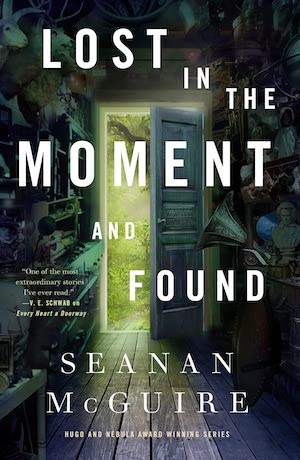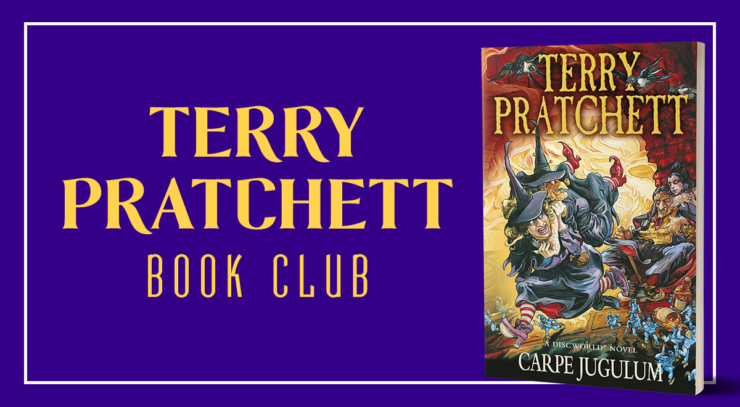Don’t worry, the drop from this slab-of-rock bridge is definitely only two feet. Perdita said so.
Summary
Hodgesaargh goes out looking for the baby phoenix. Granny Weatherwax gets up in the morning and leaves her home just an hour before Nanny Ogg arrives looking for her, and Agnes arrives an hours later. Granny has laid out all the cottage’s things, inventory for the next occupant. Outside, Agnes tries to talk to the bees, and then notes magpies. When the third arrives, Agnes realizes that Granny was thinking in threes—set out possessions in threes, stopped her clock at three past three. Nanny knows Esme didn’t get her invitation and that Magrat becoming a mother set something off in her. Granny is climbing further and further up the mountain, where no one ever ventures. Nanny tells Agnes that she reckons Esme has decided that she’s not needed anymore; that she’s to become the crone, Magrat the mother, and Agnes the maiden of the group. The Magpyr family are talking about how hard the count has worked to cure them all of those little inconveniences that prevent vampires from going anywhere. Lacrimosa’s friends are all trying to be normal kids and giving themselves names like Gertrude and Tim. Vlad has taken a shine to Agnes, which the count approves of since he turned their mother. The whole family wants to be rid of Igor as well, for his more-gothic-than-thou attitude. Nanny and Agnes find Granny’s invite in a magpie’s nest—too much gold attracted their eye.
Buy the Book


Lost in the Moment and Found
Mightily Oats arrives at Granny’s because he heard that she hadn’t come to the naming and worried that maybe she was simply too old, and thought he might offer his services for her immortal soul. Nanny and Agnes are planning to looking into a crystal to find out where Granny has gone to, but when Oats offers to walk them home, Agnes takes him up on it (she’s not very keen on flying yet). She can’t pretend that she doesn’t find him tedious and boring, but centaurs cross their path and Oats mentions little blue men he’s seen… and also vampires. Agnes is about to quiz him on how he can perceive the vampires when they hear a cry and Hodgesaargh emerges with his phoenix-luring kit. Agnes thinks to mention to him that phoenixes are generally not supposed to have parents, and asks if he saw Granny in the woods. He tells her which direction she went off in. Oats and Agnes make it to Nanny’s, but the scrying doesn’t work with only two—they need Magrat. Nanny can’t go back to the castle with the vampires, so Agnes decides to take Oats, seeing as he’s similarly immune. That and the fact that he knows a ton of vampire lore and what stops them. They get to town and notice everyone’s wearing scarves around their necks and looking vacant, while Lancre is being patrolled by hired help. They find a cart bringing empty coffins to the castle and get inside to smuggle themselves in.
Oats knocks out Igor, they bless some water in the kitchens to make it holy, and head upstairs to find Magrat decorating the nursery. She doesn’t believe there’s anything wrong with their houseguests and isn’t keen on helping until Agnes tells her that it’s about Granny and that she’s taken her box of things with her. Magrat tells Oats to gather up the baby’s things (there’s a lot), and agrees to come along. They get to Nanny’s and scry and find that Granny is in a cave, and that they’ll have to get after her (without brooms because the ground’s gnarly) to find out what’s going on. Magrat insists on coming with the baby, but Oats cannot. Hodgesaargh comes across a bird that seems to be shifting its shape and burning up as it does so. The count talks to his wife about the coming new era; he’s the one who injured the phoenix, and he’s spying on everyone using his magpies. Nanny, Magrat, and Agnes set out over the gnarly ground to get to Granny. Perdita points out that Nanny is thinking something about the baby and Granny and wonders if it has to do with Borrowing, if Granny is using the baby to keep an eye on them. They get to the bridge and Perdita saves Agnes in crossing by believing the stream below isn’t that deep, but then she takes over—Nanny has to deck her to bring Agnes back.
They find Granny after heading through a cave that has become the inside of her head. They wake her by opening her box of stuff, but she insists that Lancre has three witches and they surely don’t need her anymore. The trio make to leave, but Nanny claims to have forgotten her pipe and goes to sit with Granny, asking what’s really gone wrong. Granny admits that she can’t fight these vampires; she’s been trying, but they nearly got to her in her own cottage. In the cave, they have a hard time finding her. Nanny tells the others that they’re going to carry on without her anyway, and they leave. The trio have a meeting at Nanny’s where she tells them that Magrat and Agnes will go back to the castle and Agnes will keep an eye on the vampires, looking for weaknesses; if she can’t find any, Nanny tells her to marry Vlad and try to change him that way. Magrat and Agnes are both appalled, but Nanny’s insistent. Then she introduces them to the Nac Mac Feegle, who raid her stores about once a year—they’ve been driven out of Uberwald, along with all the other “unfashionable” creatures. Nanny tells Magrat to give them the little island the herons nest on to get them on their side because they love to fight. Then she tells Jason to get the Ogg clan to set up a mob so they can get into the castle under their cover.
Commentary
There’s a thing I appreciate, which is that Pratchett might be the only writer to successfully unsexify vampires?
Which is not to say that I don’t appreciate a sexy vampire, or that plenty of pieces of fiction haven’t worked hard to make them sexy but also disgusting at the same time, but it’s an intrinsic link, is my point. Because vampires are allegorically a method for dealing with the two very fraught human topics of sex and death, so it’s pretty much built in. But in this story, the vampires are actually being used to a different end, more toward an allegory on progress and popularity and change, which makes the sexiness factor pretty superfluous. And given Pratchett’s own natural leanings when writing sex and romance, I kinda love that he just doesn’t bring it to bear? Vlad is sexy to Agnes, but not more so than any other relatively suave romantic lead he’s written (and they’re only ever relatively suave, of course).
Moreover, its importance within the plot here is treated the opposite way that sex is treated in vampire stories: Nanny suggests to Agnes that she might have to hunker down and marry Vlad if they can’t figure out another way to fix the situation. There’s nothing remotely attractive about that scenario, and both Magrat and Agnes are repulsed by the idea, playing further into the understanding that many women have given up their autonomy and lives to exactly this end throughout history. There’s nothing romantic about that, and it’s certainly not alluring.
This is further supported by Pratchett’s tendency to allow his main characters to be utterly average people in terms of age ranges, body shapes, and appearance. One piece that always comes up in vampire narratives is the idea that of course any person given the chance would leap at the ability to be young and hot forever, but what if you’re neither of those things? Or you’re just young and pretty average? Where’s the allure then, and if it’s in the eternal life aspect… are you sure you’ve thought this through?
And because the Magpyr family is determined to be modern, so much of the aesthetic that people love in vampire fiction is also bled out (sorry, I typed it and then realized what I’d done, so I leave it for you to witness my shame) of the story as well. We don’t even get the dusty gothic creak of it all. At which point, they’re basically just… shitty rich people who want to feed on your life-force. Which is a given, really, I could’ve just stopped at shitty rich people.
Outside of that, Granny’s anger over what she “ought” to do feels very much in keeping with every wise person who tells me to purge the word “should” from my vocabulary. (Not as a functional piece of language, but as a concept—the “should”s of the world are often erroneous, is the point. I think that’s what Yoda actually meant when he said “there is no try,” but he’s so big on vagaries that it gets lost.)
The introduction of the Nac Mac Feegle will obviously gain traction down the road, but I do love the starting point of knowing they raid Nanny’s liquor once a year. Also, every time Nanny goes on about the booze she makes, it gives me bad ideas, it’s not like my apartment has room for a still or fermentation gear. Guess that’s something for me to shoot for later in life… *sighs longingly*
Asides and little thoughts:
- I love the difference in rhymes and aphorisms that Nanny and Agnes use. The factors of oral storytelling working via generation, geography, lineage, it’s always so interesting to catalogue. One of my personal favorites has always been comparing rhymes in children’s clapping game rhymes (Miss Mary Mack and Miss Susie, and that ilk) from region to region.
- I know in describing the construction of the Nac Mac Feegle, Pratchett mentioned putting a little Braveheart and Rob Roy in there, describing them as “movies made by people sitting on the biggest piece of land ever stolen from its owners by trickery, genocide and war” which… as a person who always found the adoration for Braveheart pretty overblown (and is currently sitting on said piece of land)… I mean, yeah.
- I always meant to go see the Witch of Wookey Hole (in Somerset), which he’s clearly basing the stone witch at the front of the cave on, but I never got around to it. Though I like his version of the story better—that the witch simply stayed there until she changed, rather than getting turned to stone by a monk.
Pratchettisms:
People often got the wrong idea about Nanny Ogg, and she took care to see that they did.
Any fool could be a witch with a runic knife, but it took skill to be one with an apple-corer.
The bough broke. There were plenty of others below it, but they just served as points of interest on the way down. The last one flipped Agnes into a holly bush.
Mrs. Scorbic was permanently angry, in the same way that mountains are permanently large.
She drummed her fingers on the box as if accompanying a thought on the piano, and then picked it up.
Next week, we’ll read up to:
“Let’s kick some bat.”










